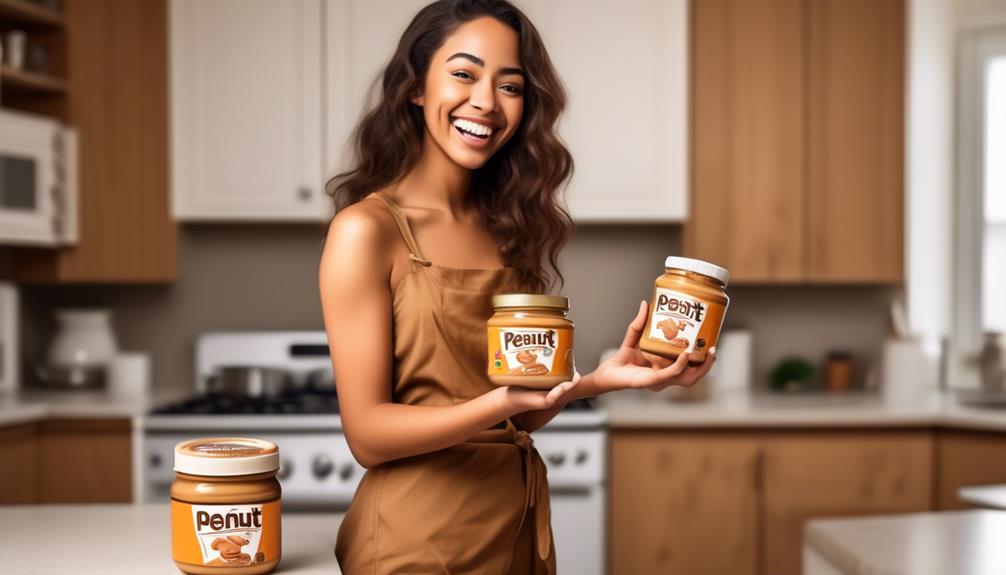Hydrogenated oils in peanut butter help create a smooth texture and prevent oil separation, making it easier to spread. They also extend the product’s shelf life. However, these oils can contain unhealthy trans fats, which raise bad cholesterol and increase heart disease risk. If you want to make healthier choices when selecting peanut butter, you should check ingredient labels for hydrogenated oils and consider natural alternatives that are free from these additives. Discover more options available to you.
Key Takeaways
- Hydrogenated oils are added to peanut butter to prevent oil separation and maintain a smooth, creamy texture.
- These oils extend the shelf life of processed peanut butter, making it more stable for storage.
- However, hydrogenated oils can contain trans fats, which are linked to increased heart disease and stroke risk.
- Reading ingredient labels helps consumers identify peanut butters with hydrogenated oils and potential trans fats.
- Natural or organic peanut butters typically avoid hydrogenated oils, offering a healthier and more authentic flavor.

Have you ever wondered what keeps your peanut butter smooth and spreadable? The secret often lies in hydrogenated oils. These oils, created through a process that adds hydrogen to liquid vegetable oils, help prevent the separation of oil and solids in your favorite nutty spread. This means you can enjoy that creamy texture without the hassle of stirring. However, hydrogenated oils come with a caveat: they can contain trans fats, which have raised concerns in recent years regarding trans fat health.
Trans fats are artificial fats that can increase bad cholesterol levels while lowering good cholesterol. This combination can lead to an increased risk of heart disease, stroke, and other serious health issues. Because of these risks, many health organizations recommend limiting trans fat intake as much as possible. If you’re checking the ingredient labeling on your peanut butter, you might be surprised to find hydrogenated oils listed as one of the ingredients. It’s essential to be aware of what goes into your food, especially if you’re trying to maintain a healthy diet.
When you’re shopping for peanut butter, consider looking for natural or organic options that don’t include hydrogenated oils. These varieties often use only peanuts and a bit of salt, offering a more wholesome alternative without the added trans fats. The taste may vary, but many people find that natural peanut butter has a richer, more authentic flavor. Plus, you won’t have to worry about the health risks associated with trans fats.
Ingredient labeling is vital in making informed choices about what you consume. By reading the labels, you can quickly identify whether a peanut butter brand uses hydrogenated oils or if it focuses on healthier alternatives. Look for terms like “no trans fats” or “natural ingredients” to guide your choices. In today’s market, there are plenty of options available that cater to health-conscious consumers. Additionally, understanding the impact of trans fats on health can empower you to make better dietary choices.
Ultimately, the choice is yours. While hydrogenated oils can keep your peanut butter smooth and stable, they might not be the best for your health. It’s worth taking the time to explore the different peanut butter options available. You’ll likely find that choosing a healthier alternative not only benefits your body but also enhances your overall peanut butter experience.
Frequently Asked Questions
Are Hydrogenated Oils Safe for Children to Consume?
Hydrogenated oils aren’t the best choice for children’s diets. When it comes to childhood nutrition, you want to prioritize healthy fats that support their growth and development. These oils can contain trans fats, which might pose risks to ingredient safety. Instead, opt for natural peanut butter that uses just peanuts and salt. This way, you ensure your kids get a nutritious snack without harmful additives that could affect their health.
How Do Hydrogenated Oils Affect Cholesterol Levels?
Imagine enjoying a tasty treat, but it’s secretly sabotaging your heart health. Hydrogenated oils can raise bad cholesterol levels (LDL) while lowering good cholesterol (HDL). This imbalance can lead to increased risks of heart disease. So, when you’re considering what to eat, remember that those oils might not be your best friend. Keeping an eye on your cholesterol impact is essential for maintaining a healthy heart and overall well-being.
Can Hydrogenated Oils Contribute to Weight Gain?
Yes, hydrogenated oils can contribute to weight gain. These oils have a high caloric density, meaning they pack a lot of calories into a small volume. When you consume foods with hydrogenated oils, your body absorbs the fats quickly, which can lead to an increase in overall caloric intake. If you’re not balancing those extra calories with physical activity, you might find it harder to maintain or lose weight.
What Are Natural Alternatives to Hydrogenated Oils in Peanut Butter?
If you think peanut butter can’t get any better, wait till you try it with natural alternatives! Ditch those hydrogenated oils and embrace natural sweeteners like honey or maple syrup for a flavor explosion. Add in some plant-based fats like coconut oil or avocado oil to elevate the creaminess. You’ll not only enhance the taste but also feel good about what you’re spreading on your toast. Trust me, your taste buds will thank you!
Are There Any Regulations on Hydrogenated Oil Usage in Food Products?
Yes, there are regulations on hydrogenated oil usage in food products. You’ll find that regulatory compliance varies by region, but many countries have set limits on trans fats, which are often found in hydrogenated oils. Additionally, labeling transparency requires manufacturers to disclose any hydrogenated oils in their ingredients. So, when you shop, you can check labels to verify you’re making informed choices about the products you consume.
Conclusion
In summary, hydrogenated oils in peanut butter can alter texture, extend shelf life, and impact health. They may make your spread creamier, but they can also introduce unhealthy trans fats. By choosing natural alternatives, you can enjoy richer flavors, better nutrition, and peace of mind. So, opt for creamy goodness, embrace wholesome ingredients, and savor the true taste of peanuts. Make informed choices, enjoy better health, and relish every bite of your favorite spread.









